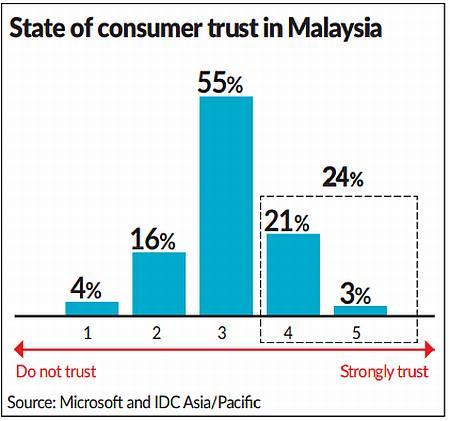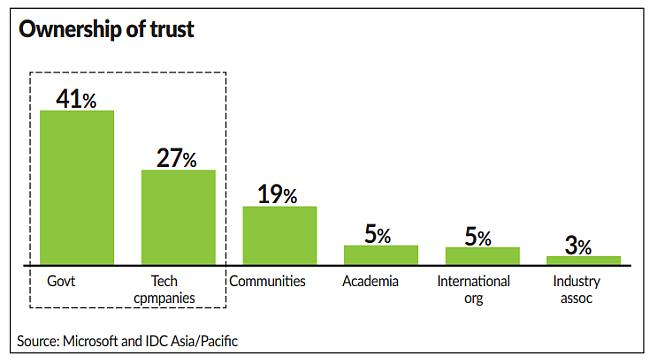Trust crucial for digital services
AS the usage of digital services increases, there is a need to address the trust gap between consumers and businesses to further support a digital-based economy, reveals a recent survey.
Notably, consumers are becoming more aware of cybersecurity risks and the issue of data privacy in the hands of organisations holding on to their personal data.
A study from Microsoft and IDC Asia/Pacific, titled “Understanding Consumer Trust in Digital Services in Asia Pacific”, highlighted that only 24% of consumers in Malaysia believe their personal data will be treated in a trustworthy manner by organisations offering digital services.
The study, which surveyed 453 consumers in Malaysia, aimed to understand consumers’ expectations of trust, uncover their experiences with digital services and provide tangible insights to organisations to help bridge the gap by earning and sustaining the trust of consumers in the digital world.
Given that almost all transactions and interactions today are becoming digital, addressing the trust gap can boost an organisation’s brand with consumers.
“The upside for organisations with a trusted digital platform is tremendous as Malaysia is a digitally active market, where almost all of the transactions and interactions here would be digital in the near future,” says Dr Jasmine Begum, Microsoft Malaysia and New Markets director of legal and corporate affairs.

“However, despite consumers’ increasing reliance on digital services, there is still a considerable trust gap that needs to be addressed. Most consumers still do not perceive organisations to be trusted data stewards. I urge business leaders to do more to understand what drives consumer trust and focus on how they can build trust and make it a key competitive advantage for their digital services,” she adds.
The study asked respondents to provide their opinions on the five elements of trust – privacy, security, reliability, ethics and compliance – when using digital services.
It found that consumers feel that all five elements of trust are almost equally important to them. Specifically, privacy (92%), security (91%) and reliability (88%) emerged as the top three most important elements.
Consumers also have the highest expectations of trust from financial services institutions, followed by education institutions and healthcare organisations.
“As our digital economy continues to grow manifold, it has also opened various risks. Data privacy remains a key concern with both consumers and businesses being at risk of data breach. We hope our efforts in creating a safer cyberspace for Malaysia will continue to align,” comments CyberSecurity Malaysia chief executive officer Datuk Dr Amirudin Abdul Wahab.
As technology continues to transform the way we live and work, organisations providing digital services and those that are harnessing the capabilities of artificial intelligence (AI) should be responsible for fulfilling the five elements of trust with their customers directly.
However, the report notes that the responsibility of building trust should not merely be on the shoulders of these organisations but also the broader industry, including government institutions and technology companies.
The study shows that consumers in Malaysia feel that the government (41%) should take the lead in building trust, followed by technology companies (27%) and communities (19%), indicating the need for a stronger partnership between governments, technology companies and other stakeholders.
When it comes to fostering trust in AI technologies, consumers feel that the government (44%) and technology companies (29%) should take the lead in ensuring AI is used in a trusted manner.
“To establish a trusted framework for the development and usage of AI and technology in general, we must first consider its impact on individuals, businesses and society. This would require a broader debate that involves the appropriate stakeholders, including the government and technology companies.

“These dialogues would need to be backed by actions, including forging closer partnerships and facilitating greater knowledge exchange. These are all necessary steps that will enable us to collectively establish a well-balanced, holistic baseline for trust for the entire industry,” Begum says.
Although the adoption and usage of AI is still in its nascent stages, there is already great optimism for AI in Malaysia, she notes. According to the study, most consumers (89%) in Malaysia are aware of AI and the majority (51%) are optimistic about the future of AI. Consumers are also generally optimistic about the impact of AI on their jobs where almost four out of five (79%) believing that the impact will be positive.
“Trust is critical for organisations to succeed in this digital world as consumers overwhelmingly prefer to transact with organisations with a trusted digital platform.
“As competition between digital services becomes more intense and global in nature, advocacy through word of mouth can be a strong differentiator for the organisation and a shot in the arm for the brand,” says IDC Asia/Pacific vice president of security practice Simon Piff.
Source: TheStar
